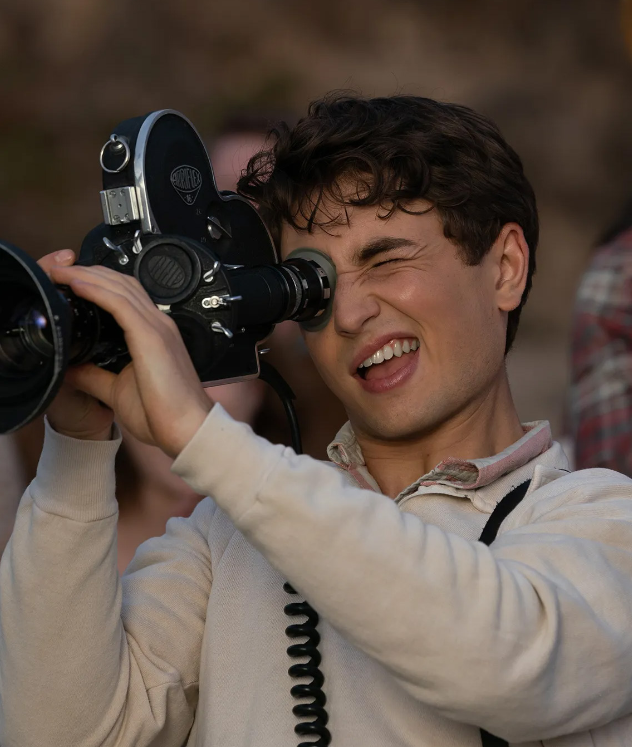In the golden age of streaming, releasing a movie solely in theaters is risky. But Steven Spielberg’s newest feature, “The Fabelmans,” is the flick to bring us back to the big screen and keep us at the behest of the projector.
“The Fablemans” follows a semi-autobiographical version of Spielberg’s life as his father brings his family from the cookie-cutter New Jersey suburbs to the arid campgrounds of Arizona to the coming-of-age story’s conclusion in the hills of Hollywood. It’s the first project from Spielberg that dives deep into the critically acclaimed director’s childhood.
Spielberg — director and executive producer — is portrayed by Sam Fabelman (Gabriel Labelle), who, from a young age, points a camera at everything that moves. Michelle Williams gracefully plays his mother, Mitzi, who embodies the color schemes of Fitzgerald’s Daisy Buchanan. Her magnetic personality, virtuoso piano playing and dancing personify the creative arts, muchto the dislike of her husband, Burt Fabelman (Paul Dano). Like Steven’s real father, Burt is a pragmatic electrical engineer who sees each family uprooting as a strategic path to job security.
Sam functions as the Rosetta Stone between his parents — one a scientist and the other an artist. Like Spielberg’s aliens in “Close Encounters of the Third Kind,” who rely on musical tones and colorful lights to speak with government scientists, Sam’s early films attempt to bridge the gap between his parents’ opposing personalities. Though, to no avail, Sam’s movies become more attune and allow him to document the things unfolding before his eyes.
The first act acts as an exposé to cinematic wonderment, as an elementary school-aged Sam (Mateo Francis-DeFord) is terrified and captivated by a train crashing into a car in the first movie he ever sees, “The Greatest Show on Earth.”Through trial and error, Sam recreates and enhances the sequence using his father’s camera and a Lioneltrain set. The experience resulting in his first motion picture is the MacGuffin that sends the boy on his directorial journey.
Any Spielberg fan will appreciate the primitive techniques Sam uses to make his early films: scissors, tape and Boy Scout know-how allow the young Fabelman to practice the craft that made his real-life counterpart a household name. Sprinkled throughout the film are instances of Spielberg maturing into his directing style. With limited extras, Sam convinces the audience of his first movie — “Escape to Nowhere” — that his small troop of friends is a field of slain WWII soldiers. By punching holes in celluloid, he makes plastic BB guns appear to be firing real bullets.
Along the way, Spielberg’s traumatic childhood woes are brought into stark relief by the summer blockbusters that bear his Amblin and DreamWorks trademarks. Sam must hide his knowledge of an affair between his mom and Burt’s best friend, Benny (Seth Rogen). Spending his teenage years in the early ‘60s at a Californian high school, Sam endures rampant antisemitism because of his Jewish heritage.
The Fabelmans is meta at times, with several minutes spent showing extras watching movies. In a scene where Burt tries to explain that a movie is only moving pictures, you can’t help but notice the light coming out of the machine behind you, in the theater, as it projects the next image onto the screen. And you begin to wonder if you’re falling for the same trick.
Though intense at times with family interventions and subtle racism, the film is a well-earned self-evaluation by Spielberg. As Spielberg’s films have defined the lives of film enthusiasts everywhere, “The Fabelmans”offers something for everyone.
While the dialogue and mannerisms of the young actors are far from accurate for the period, the cast stays true to the source material. The fiction disclaimer, moreover, doesn’t take anything away from Spielberg’s eloquent reflection of inner ambitions.
The struggle to balance talent against familial obligation is a constant theme as each Fabelman must reckon with their passions. “We are junkies,” said Sam’s Ukrainian uncle Boris after a family death, “and art is our drug.” Like any young person striving to succeed in the arts, they face resistance from family and society. Spielberg’s theatrical avatar endures those same obstacles, as the road to becoming a director is narrow and thankless. But Burt’s initial reluctance to let Sam pursue his dreams in the entertainment industry subsides when he sees the dissatisfaction with his son’s hunger for self-expression.
Ultimately, even if John Williams’ score is far from memorable, and the only indication of the film taking place in the ‘60s is the camera equipment and the distinctive car chassis, “The Fabelmans”is a once-in-a-generation film about a director with no parallel in modern Hollywood.







